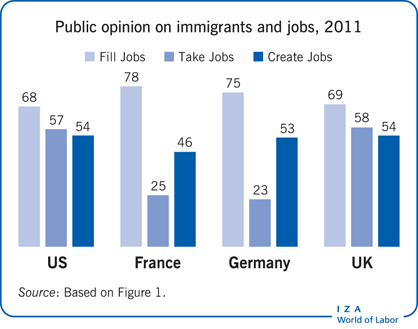Elevator pitch
Neither public opinion nor evidence-based research supports the claim of some politicians and the media that immigrants take the jobs of native-born workers. Public opinion polls in six migrant-destination countries after the 2008–2009 recession show that most people believe that immigrants fill job vacancies and many believe that they create jobs and do not take jobs from native workers. This view is corroborated by evidence-based research showing that immigrants—of all skill levels—do not significantly affect native employment in the short term and boost employment in the long term.

Key findings
Pros
Immigrants who are self-employed or entrepreneurs directly create new jobs.
Immigrant innovators create jobs indirectly within a firm, leading to long-term job growth.
New immigrants fill labor shortages and keep markets working efficiently.
High-skilled immigrants contribute to technological adaptation and low-skilled immigrants to occupational mobility, specialization, and human capital creation; both create new jobs for native workers.
By raising demand, immigrants cause firms and production to expand, resulting in new hiring.
Cons
Low-skilled immigrants may compete in the short term, but the effect is small and not statistically significant.
If low-skilled immigrant workers only supplement the work of high-skilled native workers, they may be trapped in low-skill, low-paying jobs.
If low-skilled immigrant labor is employed in lieu of physical capital, technological advances and capital upgrading are impeded.
A country that becomes dependent on low-cost immigrant workers may have to outsource jobs when these workers are not available.
Immigrants may increase production without boosting productivity.